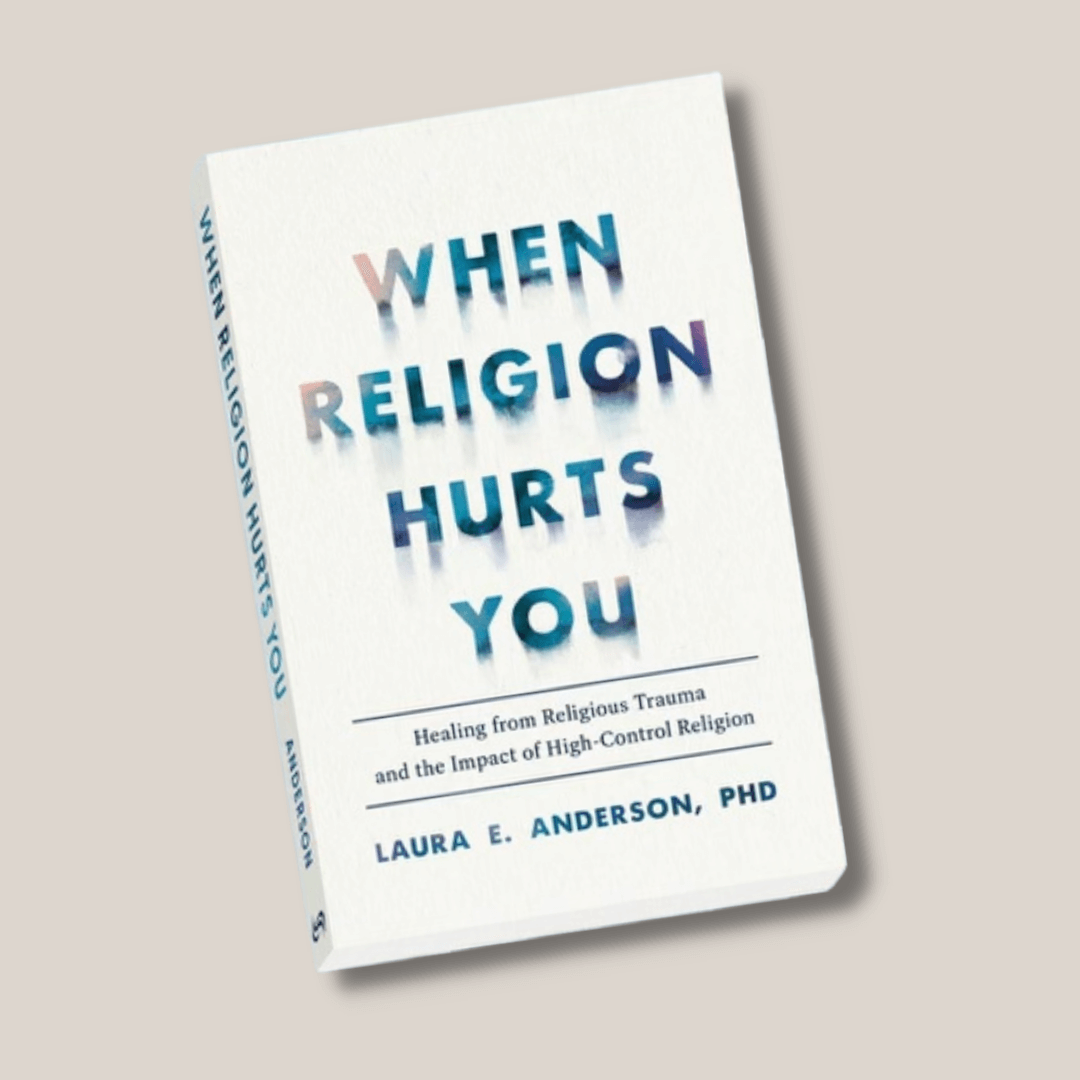In When Religion Hurts You, Dr. Laura Anderson draws on her training as a trauma therapist, scientific research, and personal experiences of growing up in a high demand/high control religious system and resolving the trauma that resulted, to offer hope for what life can be after deconstructing and/or deconverting from one’s faith. This groundbreaking book explains what religious trauma is, how it lives in our bodies, adverse religious experiences, and what living in a healing body after religious trauma can be like.
Laura challenges the cultural beliefs suggesting bad church experiences are simply a result of sinful humans and instead helps the reader recognize how messaging, beliefs, and practices present in high demand/high control religions can have a multi-dimensional impact, creating the need for healing to happen in multiple dimensions as well. Instead of viewing healing as an end point which someone arrives at and is done healing, Laura offers the consideration that healing is an ongoing process that encompasses every moment and aspect of life. Using a blend of real-life examples and research, this book offers the reader education while inspiring hope that reclaiming their life after adverse religious experiences and/or religious trauma is both possible and is already happening in the day-to-day moments of life.
Order your copy of “When Religion Hurts You” anywhere you buy books!
About the Book
Religion has been accepted as a positive, supportive factor in our culture. While many people recognize this as their reality, a growing number of people are speaking out and seeking help as they realize the experiences they had in religious groups and systems are leaving long-lasting, intense impacts that researchers and clinicians are identifying as trauma. Contrary to previous thought, religious trauma is not resolved by merely rejecting one’s faith, belief system, or ideology and embracing atheism.
Religious trauma is trauma. Like all trauma, the process of resolving trauma and reclaiming one’s life is complex and multi-dimensional–but it is possible.
“Anderson strikes a smart, balanced tone…[She] encourages a gradual healing process that looks different for everyone.”
“Anderson’s is a refreshing and hopeful voice during what feels for many of us like a time of great despair.”
—Bradley Onishi, PhD, Scholar and Co-host of the Straight White American Jesus podcast
“A compassionate road map for those recovering from religious trauma.”
“The book includes eye-opening examples of what abuse can look like in a religious context, widens the definition of abuse beyond physical or sexual maltreatment, and identifies red flags in teachings, practices, and relationships. There are moving personal examples as well: Anderson recalls instances of disrespect and belittling, fear- and isolation-inducing warnings not to speak about what was happening, and community-wide blacklisting that prevented her from moving outside of her religious community.”
“Have you ever had a bad experience at church? If so, you know that it can be hard to talk about. Fifteen years ago, there were even fewer resources available for people who had negative religious experiences. Dr. Laura Anderson was one of the first people to speak out about this issue, and she has helped to create a more supportive community for people who are leaving or questioning their faith.”
“When Religion Hurts You is a valuable addition”
—Steven Hassan, PhD, MED, LMHC, NCC, Founder and Director of Freedom of Mind Resource Center Inc.
“When Religion Hurts You is the informative guide needed when making sense of and healing from the disorienting and painful experience of religious trauma.”
—Hillary L. McBride, PhD, Psychologist, Author, Speaker and Podcaster
“When Religion Hurts You is the most comprehensive, reflective, and helpful book about recovering from religious trauma and church abuse that I’ve ever read.”
—Matthew Paul Turner, #1 New York Times bestselling author of What Is God Like?
“Dr. Laura Anderson has provided a valuable resource that will help people not only to understand what religious trauma is but also to find a holistic path of healing beyond it.”
—David Hayward aka NakedPastor
“When Religion Hurts You is a welcome home for those struggling to leave the emotional terrain of adverse religious experience and abuse.”
—Dr. Jennifer Mullan, Founder of Decolonizing Therapy, LLC
“Dr. Laura Anderson understands. She understands what it means to grow up in high-control religion, or what she often refers to as HCR. She understands what it means to have experiences within organized religion that can only be described as abusive. Dr. Anderson understands the impact of these experiences and the religious trauma can ripple in waves in both short-term and long-term waves. Incredibly well researched and yet warm and relatable, "When Religion Hurts You" is a vital resource for those seeking to unpack traumatic religious experiences, those healing from religious trauma, and those simply seeking to better understand the impact of high-control religion.”
“I am a gay man who was raised in the Church of God and experienced an extreme amount of trauma. I didn’t know it was trauma until reading your book. I just turned 50 and decided to write my story. This process changed my perception of who I am and what happened to me. Because of [When Religion Hurts You], I could see things in a new light and have begun to heal in more ways that I thought possible. My experiences in this HCR included an attempted exorcism, extreme fasting to get God’s attention, shunning from the church, developing Scrupulosity,, social anxiety, depression, isolation from family, bullying, etc. Thank you for writing your book and sharing your story. Thank you, thank you, thank you!"
—Anonymous reader
“When Religion Hurts You: Healing from Religious Trauma and the Impact of High-Control Religion is an absolutely fantastic book and the first of its kind that I've had the pleasure of reading. Laura Anderson is so knowledgeable and experienced on the topic of religious trauma, and her writing is both accessible and deeply informative. She uses her own experience as a roadmap of sorts, and highlights all the ways adverse religious experiences have impacted her and what she's learned along the way.
Something I truly appreciate about this book is Anderson's unbiased tone throughout her writing; she approaches the subject of religious trauma with compassion and leads the reader toward a deeper understanding of their pain without trashing the idea of religion or using religion as the answer to our problems. Her clinical experience and her in-depth knowledge of complex trauma and high-control religion makes her uniquely qualified to share these insights with us. Something else I appreciate is Anderson's decision to not make this a step-by-step instruction guide for healing. Everyone's journey is different and is informed by their own personal experiences.
This book is truly a gem and I can't wait to recommend it to everyone!”
“I just wanted to say thank you. I read your book and literally for the first time in my life I may have an answer for my “anxiety”. I made I through graduate school and working a career in anesthesia and never did I hear or learn about CPTSD. Thank you again for your publications and work and allowing more people to get the help they need. I look forward to discussing further with my therapist what I learned from you.”
—Anonymous reader
“I finished reading this a few days ago and I'm still thinking about all the various things covered in the book. So much of it made sense, and it really helped me to think through so many aspects of the evangelical subculture I was immersed in from birth. Really recommended this book for anyone who is struggling to disentangle their faith from harmful practices but doesn't want to leave their faith.”


